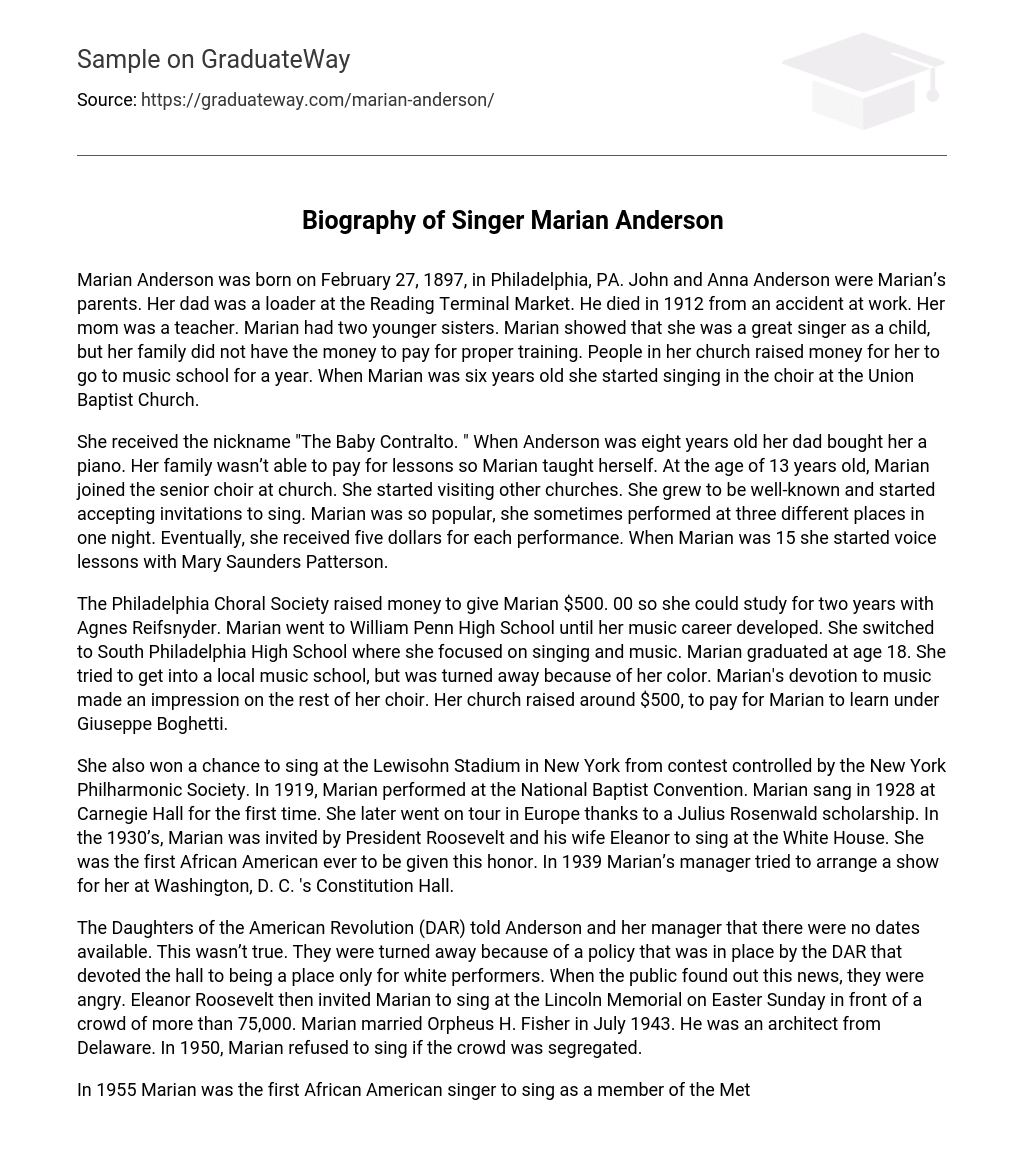Marian Anderson, born on February 27, 1897, in Philadelphia, PA, was raised by her parents John and Anna Anderson. Her father worked as a loader at the Reading Terminal Market while her mother pursued teaching. Unfortunately, Marian’s father died in 1912 due to a work-related accident. Despite having two younger sisters, Marian displayed remarkable singing skills from an early age; however, her family couldn’t afford proper training.
In order to fulfill her musical aspirations, members of Marian’s church organized fundraisers to send her to music school for one year. At just six years old, Marian began showcasing her vocal talents by singing in the choir at Union Baptist Church.
She was given the nickname “The Baby Contralto.” At the age of eight, Anderson’s dad purchased a piano for her. Due to financial constraints, her family couldn’t afford lessons, so Marian taught herself. At 13, she became a member of the senior choir at her church and began visiting other churches. Her fame grew, and she started receiving invitations to sing. On occasion, she even performed at three different venues in one evening. Eventually, she started earning five dollars per performance. At 15, Marian began taking voice lessons from Mary Saunders Patterson.
The Philadelphia Choral Society fundraised to provide Marian with a $500.00 scholarship, enabling her to study for a period of two years with Agnes Reifsnyder. Initially attending William Penn High School, Marian redirected her focus towards singing and music at South Philadelphia High School, ultimately graduating at the age of 18. Despite facing racial discrimination, Marian’s unwavering commitment to music left a lasting impact on her choir. Recognizing her talent and determination, her church gathered approximately $500 to support Marian’s education under the guidance of Giuseppe Boghetti.
She also won a chance to sing at the Lewisohn Stadium in New York from contest controlled by the New York Philharmonic Society. In 1919, Marian performed at the National Baptist Convention. Marian sang in 1928 at Carnegie Hall for the first time. She later went on tour in Europe thanks to a Julius Rosenwald scholarship. In the 1930’s, Marian was invited by President Roosevelt and his wife Eleanor to sing at the White House. She was the first African American ever to be given this honor. In 1939 Marian’s manager tried to arrange a show for her at Washington, D. C.’s Constitution Hall.
The Daughters of the American Revolution (DAR) refused Anderson and her manager, falsely claiming unavailability due to their policy of only allowing white performers in their hall. This caused public outrage and prompted Eleanor Roosevelt to invite Marian to sing at the Lincoln Memorial on Easter Sunday, with a massive crowd of over 75,000 attendees. Later in July 1943, Marian married Orpheus H. Fisher, an architect from Delaware. In 1950, she made a powerful statement against segregation by refusing to perform if the audience was segregated by race.
Marian made history as the first African American singer to join the Metropolitan Opera in New York City in 1955. She performed over a thousand times in 1956. In 1961, she had the honor of singing the national anthem at President John F. Kennedy’s inauguration. President Kennedy recognized her contributions by awarding her the Presidential Medal of Freedom in 1963. On April 19, 1965, Marian gave her final concert at Carnegie Hall. Throughout her career, she received numerous accolades including the Springarn Medal in 1939 and the Bok Award in 1941 which acknowledged her as an outstanding citizen of Philadelphia and came with a $10,000 prize.
Marian Anderson used the prize money to create the Marian Anderson Scholarships. In 1963, President Lyndon Johnson presented her with the American Medal of Freedom. On her 75th birthday in 1977, Congress awarded her a gold medal. The U.S. Treasury Department designed a commemorative medal featuring her image on a half-ounce gold piece in 1980. President Ronald Reagan granted her the National Medal of Arts in 1986, and she received a Grammy Award for Lifetime Achievement in 1991. Rather than confronting racism, Marian opted to avoid such situations.
Marian faced contrasting experiences in her profession. While she received acceptance into the most prestigious hotels and restaurants in Europe, she often found herself relegated to inferior accommodations in the US. Despite this disparity, Marian maintained a non-confrontational attitude, acknowledging that her goal was to leave a positive example for future generations. After retiring in 1965, she resided on her farm in Connecticut. Finally, on April 8, 1993, Marian passed away in Portland, Oregon.





